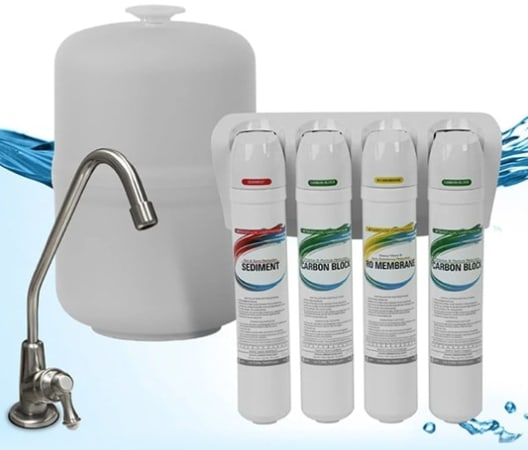Possible Causes for Salty Well Water
High Chloride Levels
A high chloride concentration in water is often the reason behind a salty taste. Chloride ions can enter the water via underground water movement over rocks, sand, aquifers, and surface runoffs. These ions dissolve in water and can’t be removed with a sediment filter. Chloride can also enter your water as a result of local pollution or from dumping sites nearby your well. Private wells near coastal areas often have salty water problems due to seawater entering your water supplies.
The EPA terms chloride as a secondary contaminant and has set its MCL to 250 mg/L. Chloride levels rarely go above this limit. Hence, drinking salty water is safe for your health unless you are on a sodium-free diet.
High Sulfate Levels
Higher sulfate levels in well water can also make it salty. Sulfates occur naturally in the earth and enter water when it moves underground. Sulfates in water can also be a result of industrial and agricultural pollution.
Salt Deposits
Private wells near salt mines and deposits usually have a higher salt content. Rainwater dissolves salt and seeps underground to contaminate well water. Private wells in New York, Kansas, Michigan, and Colorado frequently face this issue.
Seawater
Private wells near coastal areas are prone to salty water because seawater is salty. Seawater enters private wells through seeping. These wells usually produce extremely high levels of chloride ions that can corrode plumbing pipes and appliances and discolor stainless steel sinks. You’ll have to consider a whole house filter to remove higher chloride levels in the water.
Agricultural and Industrial Waste
Wells located near agricultural and industrial waste sites often have higher chloride levels. Irrigation drainage and seepage carry chloride to underground water. Private wells near these sites often have dangerous contaminants like VOCs, herbicides, pesticides, and industrial solvents.
Water Softener Problems
A water softener removes calcium & magnesium from water and replaces them with sodium or potassium. Water softeners use softening salts (sodium or potassium) to remove these minerals. As a result, softened water has a slightly higher salt content.
Softener problems like clogged drain line, cracked water line, or incorrect programming can lead to salty water. Incorrect programming tricks softener into believing that it needs more salt than required.
Fixing the issue may require simple reprogramming or a general inspection of your softener. Sometimes you may need to replace the control head or the entire unit in extreme cases.
How to find out the Chloride Concentration in my Well Water?
The only way to find chloride concentration in well water is to conduct a water test. Testing for chloride isn’t complex; you can test it at home using a water testing kit.
A certified lab is recommended for more accurate results.
Salty Well Water – Fixes
Whole House Water Filters
A whole house water filter is installed where water enters your home. Some people install a sediment filter or a water softener before a whole house filter depending on water quality. The purpose of installing a whole house filter is to supply better quality water to every tap in your home.
Reverse Osmosis
RO filters are used to improve drinking water quality. Most RO filters for well water are under sink filters that remove 99% of all the contaminants in water. A typical RO filter consists of 4-6 filtration stages with a sediment filter, carbon filters, RO membrane (chlorides are removed here), and post-RO (carbon) filter.
Some latest models also come with remineralization and UV purifiers for microorganisms. RO filters take a lot of time to filter water, which is why they come with a water tank. One important thing to consider is that RO filters waste 1-3 gallons of water for every gallon they filter.
RO filters also come in countertop versions. You can buy one if you have a small family or a tenant. Both under sink and countertop variants are equally effective in removing salty taste from water.
Recommended RO System: SpringWell’s RO Drinking Water System

SpringWell’s RO system consists of one sediment filter, two carbon filters, and a RO membrane to remove 99.9% of all impurities in well water.
The system has a 75-gallon daily filtration capacity. It comes with a pressurized tank for storing water. The unit is easy to install and maintain. Overall, it is an excellent RO system to improve potable drinking water quality.
Softener Setting
You may need to check your softener’s setting to reduce the salty taste. If your water tastes salty after it comes out of a water softener, your softener may be taking too much salt. Reduce hardness setting to reduce salt intake. Alternatively, you can get your water tested for hardness and adjust the softener accordingly.
If the water still tastes salty after adjusting the settings, the culprit can be leaky valves between resin and brine tanks. A clogged brine tank can also be a problem. Water softeners last for 12-15 years. Replacing your old softener with a new one can also fix the problem.
Is it safe to drink salty water?
Yes. Drinking salty water is safe unless you are on a sodium-free diet or suffer from blood pressure problems. Salty water contains small amounts of sodium. So, it is nothing to worry about.
How often should I get my well water tested for sodium and chlorides?
The EPA recommends annual testing for all private wells in the country. Moreover, private wells must be tested after floods, earthquakes, or whenever there is a noticeable change in water quality.
